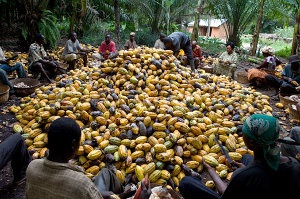Ghanaian Cocoa farmers are smiling with the introduction of free Hybrid Seedlings started in 2014.
The free seedling initiative, which is the brainchild of President John Dramani Mahama, was launched at Goaso in the Brong-Ahafo Region in 2011.
The Ghana Cocoa Board (COCOBOD) at the time of launch was to dole out 20 million of the Hybrid Seedlings to Ghanaian Cocoa farmers free of charge: This was increased to 50 million later and it has now hit 60 million.
The Hybrid Seedlings are noted to be more vibrant, early-fruit-bearing as well as pest and diseases tolerant.
The COCOBOD has so far developed some 331 nursery sites across cocoa-growing areas of the country, for these Hybrid Seedlings.
The joy of the farmers stems from the fact that the Hybrid Seedlings start fruiting-bearing just in a matter of two years.
Hitherto, there were only 27 seed gardens for the Hybrid Seedlings throughout the country.
However, with the 60 million seedlings, some 50,000 hectares of cocoa tree stock is earmarked rehabilitation, and with time, all cocoa farms would be rehabilitated to increase cocoa production 1 Million tones.
What is amazing is the fact that farmers, after receiving the free Hybrid Seedlings, are again supplied with Ammonium Sulphate fertilizer, for the first two years after transplanting the Hybrid Seedlings to the field.
Additionally, farmers are provided with foliar fertilizers that are specifically meant to boost the growth and development of the Hybrid Seedlings, at the nurseries and after transplant.
To make sure that the Hybrid Seedlings are available all year round, boreholes to support the seedling production have also been constructed at various nursery sites.
These boreholes are also serving as sources of potable water for the inhabitants of communities in which the nursery sites are located.
To realize its goal large numbers of youth in cocoa growing areas of the country have been engaged in the nursery production process; and are earning leaving out of it.
The free supply of Hybrid Seedling was designed because, prior to 2013-2014, Ghana's cocoa tree stock was declining, as most of the trees were over-aged and diseased; a situation that negatively affected the country's cocoa production.
Cocoa farmers, therefore, readily embraced the initiative and most of their farms have gone through rehabilitation and more are still being rehabilitated.
Business News of Monday, 29 February 2016
Source: Yam Frimpong







![NPP Flagbearer, Dr. Mahamudu Bawumia [L] and NDC Flagbearer John Mahama NPP Flagbearer, Dr. Mahamudu Bawumia [L] and NDC Flagbearer John Mahama](https://cdn.ghanaweb.com/imagelib/pics/869/86902869.295.jpg)









